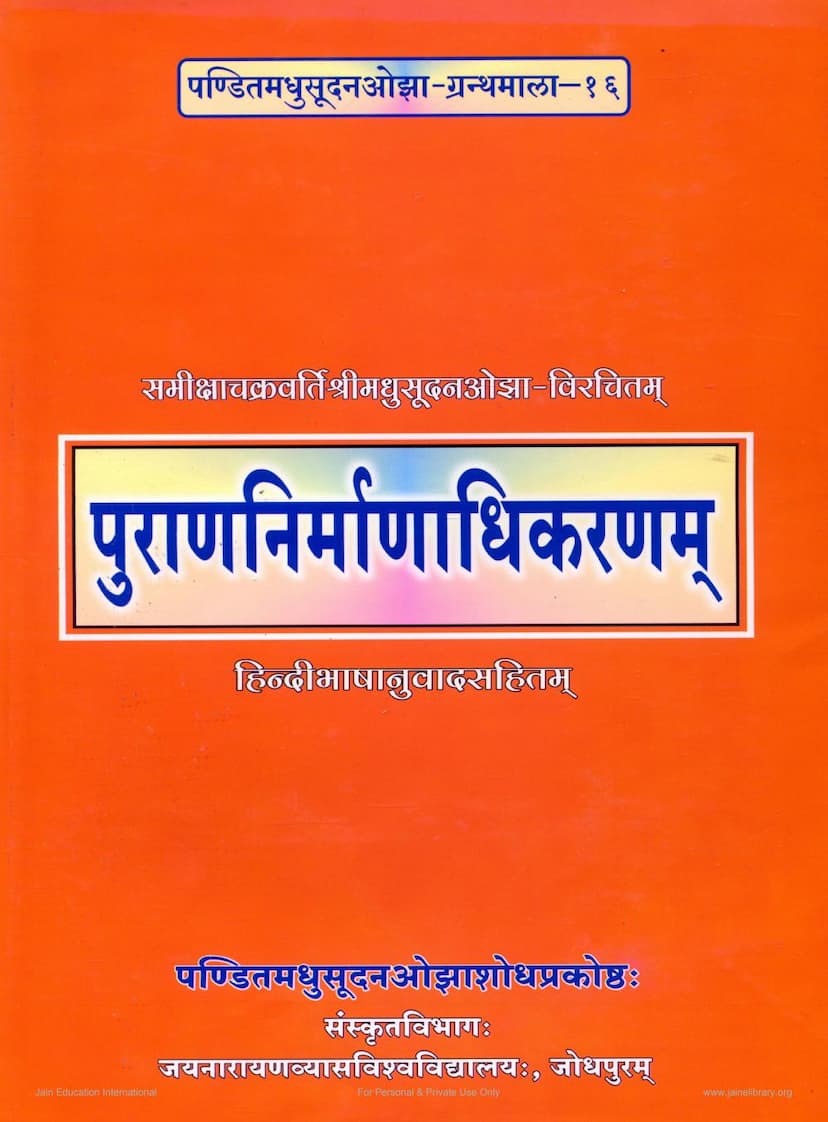Puran Nirmanadhikaranam
Added to library: September 2, 2025

Summary
Here's a comprehensive summary of the Jain text "Purāṇanirmāṇādhikaraṇam" based on the provided pages, focusing on its core arguments and the context of its publication:
Book Title: Purāṇanirmāṇādhikaraṇam (The Authority of Purāṇa Creation) Author: Pandit Madhusudan Ojha Translator: Dr. Chhail Singh Rathore Publisher: Pandit Madhusudan Ojha Research Cell, Department of Sanskrit, Jay Narayan Vyas University, Jodhpur. Series: Pandit Madhusudan Ojha Granthamala - 16 Year of Publication: 2013
Overall Purpose and Context:
This work is part of a series dedicated to publishing the critical and annotated works of Pandit Madhusudan Ojha, a prominent scholar known for his unique interpretations of Vedic literature. "Purāṇanirmāṇādhikaraṇam" is one of three major works by Ojha on Purāṇa criticism. The book aims to establish the profound significance of Purāṇas in understanding the Vedas and ancient Indian thought, a subject Ojha believed was often neglected in contemporary study. The publication underscores the effort to bring Ojha's extensive scholarship to a wider audience, translating and editing his complex Sanskrit texts into Hindi for broader accessibility.
Core Argument of Pandit Madhusudan Ojha:
The central thesis of "Purāṇanirmāṇādhikaraṇam" revolves around the antiquity and foundational role of Purāṇas, particularly the "Brahmāṇḍapurāṇa," in the development of Vedic literature. Ojha argues that:
-
Purāṇa as a Vedic Text: Ojha posits that a specific Veda, known as "Brahmāṇḍapurāṇa," existed before or concurrently with many Vedic mantras and Brāhmaṇa texts. He draws this conclusion from the mention of "Purāṇa" in Śatapatha Brāhmaṇa alongside other Vedas. This "Brahmāṇḍapurāṇa" is seen not just as a narrative but as a repository of cosmic creation knowledge ("sṛṣṭi-pratisṛṣṭi nirūpaṇātmā").
-
The Primacy of Purāṇa: Citing scriptural evidence like the Matsya Purāṇa and Bṛhannāradīya Purāṇa, Ojha asserts that Brahmā first conceived the Purāṇa, and then the Vedas emerged from his mouths. He suggests that the original Purāṇa, with its vast cosmic knowledge, was later divided into the eighteen Mahāpurāṇas for easier comprehension.
-
Purāṇa as the Source of Brāhmaṇa Narratives: Ojha argues that the narratives (ākhyānas) found in the Brāhmaṇa texts were originally sourced from this primordial Brahmāṇḍapurāṇa Veda. Over time, as the original text became less accessible, these narratives were integrated into the Brāhmaṇas.
-
The Role of Vyāsa and His Tradition: The work delves into the traditional understanding of Veda Vyāsa as the compiler of Vedic and Purāṇic literature. Ojha traces the lineage from Vyāsa to his disciples like Lomaharṣaṇa and then to Lomaharṣaṇa's disciples (including Ugraśravas), who played crucial roles in compiling, editing, and disseminating the Purāṇic corpus. He highlights the development of different recensions (saṁhitās) and the complex process of their transmission and evolution, acknowledging the eventual emergence of the eighteen major Purāṇas.
-
Critique of Misinterpretations: A significant portion of the text, especially within the editorial and translational sections, critically examines and refutes what Ojha perceives as errors or incomplete understandings in the interpretations of other scholars, particularly referencing the commentaries of Sridhar Swami on texts like the Bhagavad Gita and Śrīmad Bhāgavatam. He points out inconsistencies in Puranic lists, chronological discrepancies, and the subordination of history to devotional narratives in some interpretations.
-
The "Five Topics" of Purāṇa: Ojha aligns Purāṇic content with four primary themes found in Vedic mantras: Yajna (sacrifice), Vijnana (science/knowledge), Itihasa (history), and Stotra (hymns). He specifically connects Purāṇa to the "Itihasa" category, emphasizing its role in preserving cosmic history and philosophical insights. He further categorizes the subject matter of Purāṇas into five aspects: Sarga (creation), Pratisarga (re-creation), Vamsha (lineages), Manvantaras (cosmic cycles), and Vamśyānučaritam (genealogies).
Publication Context and Acknowledgements:
The publication of "Purāṇanirmāṇādhikaraṇam" is presented as a significant achievement by the Pandit Madhusudan Ojha Research Cell at J.N. Vyas University, Jodhpur. The Chief Editor, Prof. (Dr.) Prabhawati Chowdhary, and the editor, Pandit Anant Sharma, are recognized for their contributions to the critical edition and insightful editorial commentary, which elucidates the importance and relevance of Purāṇas in Vedic studies. Dr. Chhail Singh Rathore is acknowledged for his diligent translation into Hindi, making Ojha's complex ideas accessible. The publication is seen as a continuation of the laudable efforts to preserve and disseminate the works of Pandit Madhusudan Ojha, with gratitude extended to individuals and institutions that supported this endeavor, including the Rajasthan Patrika founder and former directors of the research cell.
In essence, "Purāṇanirmāṇādhikaraṇam" by Pandit Madhusudan Ojha is a scholarly treatise that seeks to re-establish the Purāṇas, particularly the ancient Brahmāṇḍapurāṇa, as fundamental pillars of Vedic knowledge and history. It argues for their foundational role in the development of Vedic literature and offers a critical perspective on the transmission and interpretation of these ancient texts.